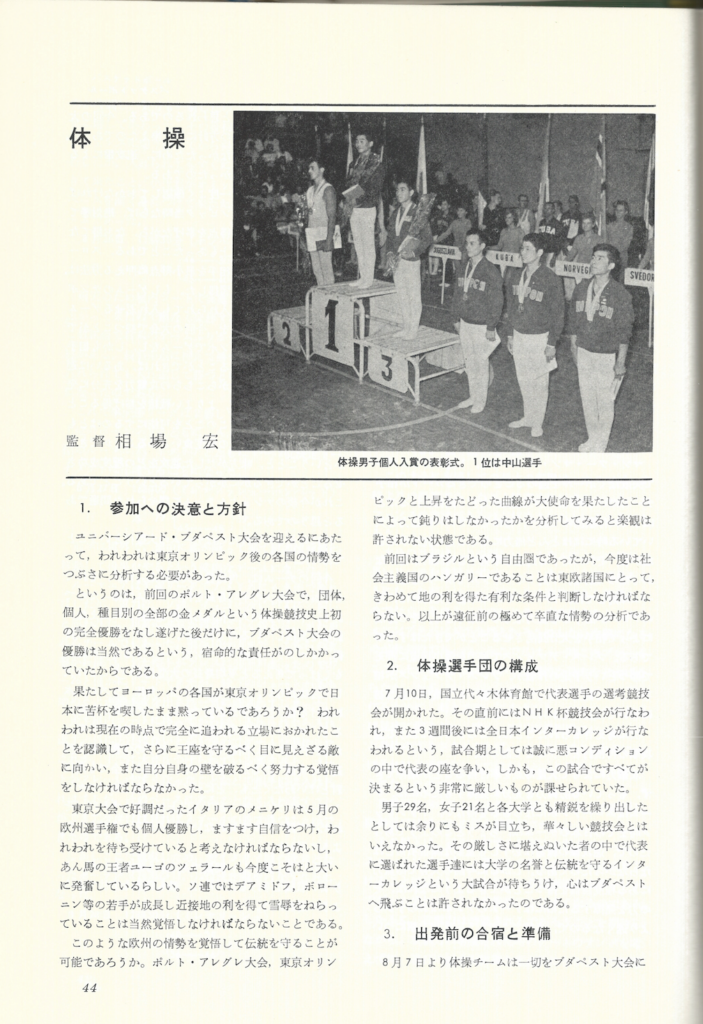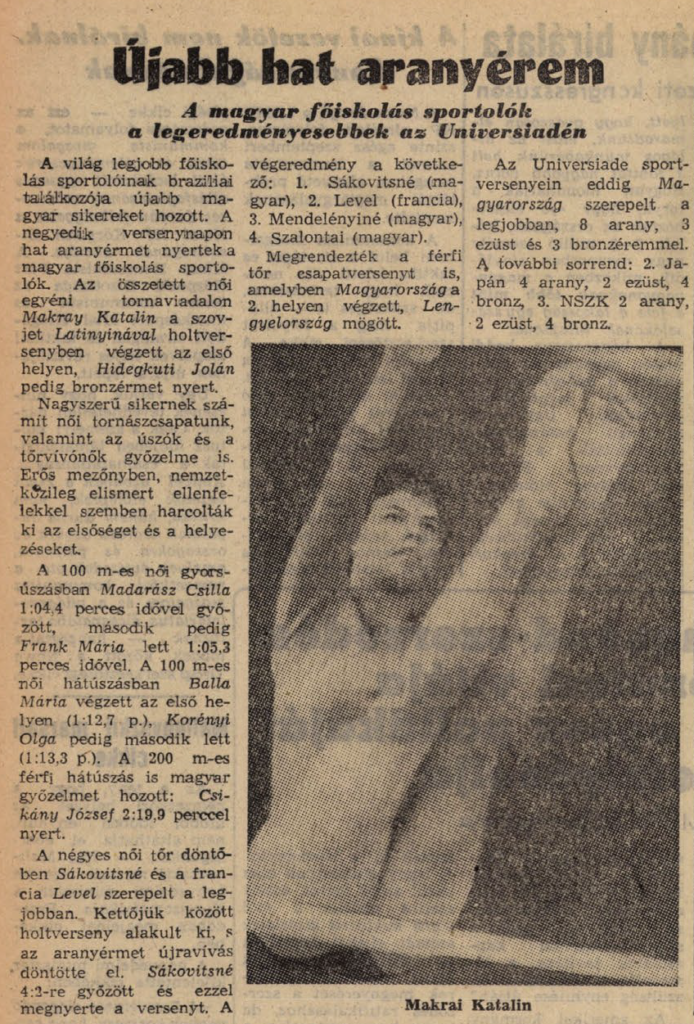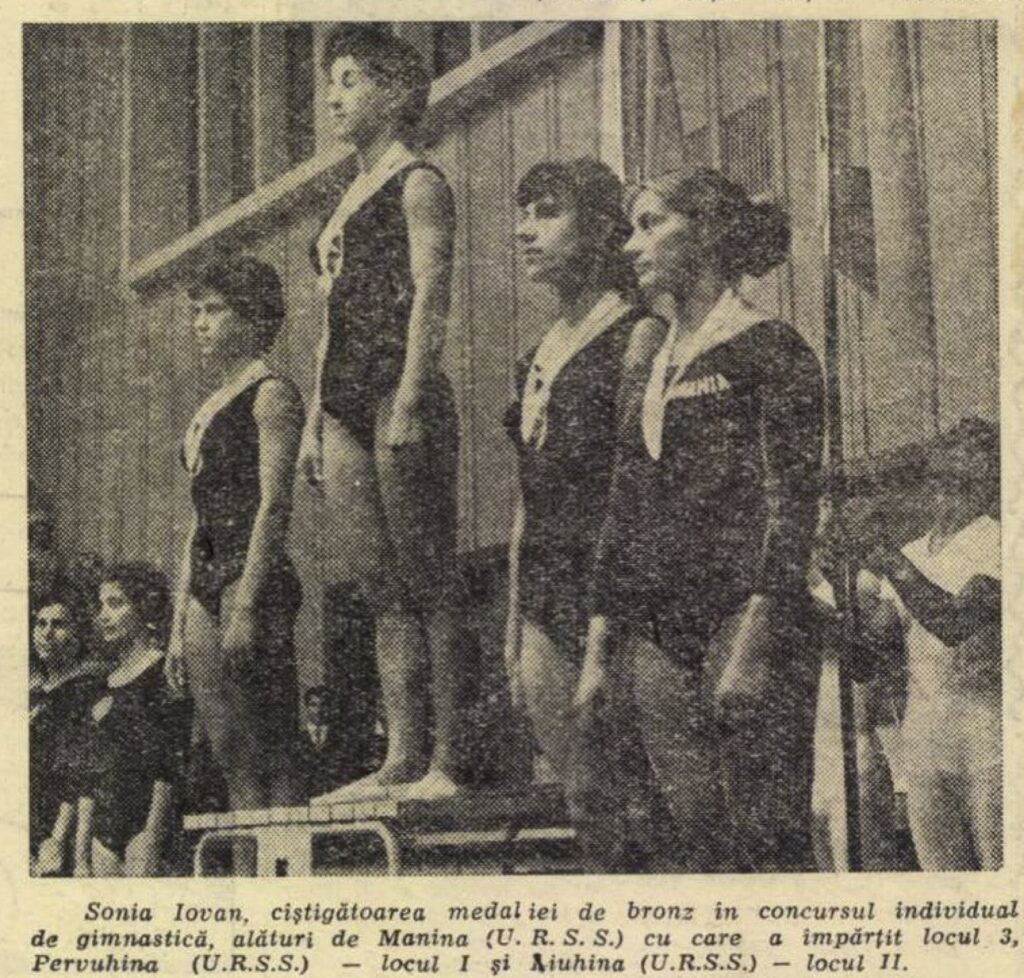Could the Japanese men repeat their results from the 1963 Universiade in Porto Alegre, where they won team gold and swept the all-around podium? What were the team’s goals in 1965? Did they worry about attending the 1965 University Games in Hungary? Did they fear that the judges in Hungary would look more kindly upon gymnasts from socialist countries? How disorganized were the 1965 University Games?
In Japan’s Official Report on the 1965 University Games, Aiba Hiroshi wrote a summary of Japan’s performance in Budapest, including the team’s preparation for the competition. Here’s a translation of the first part of that report.

1. Determination and Policy for Participation
In preparation for the Universiade in Budapest, we needed to carefully analyze the situation in each country after the Tokyo Olympics.
After winning all the gold medals in team, individual, and individual events* for the first time in the history of gymnastics in the previous tournament in Porto Alegre, Japan had a fatal responsibility to win the Budapest tournament.
[*Note: As far as I know, there weren’t event finals in Porto Alegre in 1963.]
Would the European countries remain silent after the bitter defeat by Japan at the Tokyo Olympics? We had to realize that we were now in a position to be completely chased after, and we had to be prepared to face unseen competitors to further defend our throne, and to strive to break through our own limits.
Italy’s Menichelli, who performed well in Tokyo, also won the individual title at the European Championships in May, and we must assume that he has gained more confidence and is waiting for us, while Yugoslavia’s Cerar, the pommel horse champion, seems to be very excited about the upcoming competition. In the Soviet Union, we must naturally be prepared for the fact that youngsters, such as Diomidov and Voronin, have grown up and are seeking to take advantage of being held in a nearby country to make a comeback. Is it possible to maintain our tradition in the face of such a situation in Europe? The upward curve we achieved in Porto Alegre and the Tokyo Olympics has not been slowed down by the fulfillment of the ambition of the Games? If we analyze the situation, we cannot be optimistic.
The last time we were in Brazil, a free country, and now in Hungary, a socialist country, we must think that the conditions are extremely favorable for the Eastern European countries, which have gained a geographical advantage. The above was a very honest analysis of the situation before the departure.
2. Composition of the Gymnastics Team
On July 10, the selection competition for the national team was held at Yoyogi National Gymnasium. With the NHK Cup competition taking place immediately before and the All-Japan Intercollegiate held three weeks later, the competition for the national team selection had to be held under very bad conditions, and the competition was very tough, as everything would be decided at this event.
It was not a spectacular competition because too many mistakes were spotted, even though participants, 29 males and 21 females, were the best athletes from each university. The athletes who endured the rigors of the competition and were chosen to represent their universities were not allowed to fly to Budapest, as they had to compete in a major intercollegiate competition that would protect the honor and traditions of their universities.
3. Pre-departure Training Camp and Preparation
Starting on August 7th, the gymnastics team held a training camp at the Nihon University Gymnasium and began preparations for the expedition in order to make up for the delay in preparation for the Budapest Games. The team chose Tokyo because of the tight schedule and the procedures to be completed prior to departure, and it was a major adjustment. It was a dizzying training camp, with 4 hours and 30 minutes of thorough practice to develop stamina during the day, and at night, analysis of Europe, reflection on skills, and inspection of the next day’s goals and preparations. The target was the aforementioned European athletes, and since the conditions were completely different from those of the chasing team and the defending champion, we had to be on the defensive in the face of the unknown. Not resting on the precious history of victories built by their seniors, each member of the team awakened to the weight of their responsibility and quietly put the finishing touches on their techniques. We trained until the morning of the opening ceremony on August 14th, and on the day of our departure on the 15th, we warmed up a little and headed for Budapest.
4. From Departure to Budapest
On August 15, the 10:30 p.m. departure of the charter plane left Haneda for Hamburg about an hour late after a huge send-off. It should be noted that it was Yonehara’s 22nd birthday. We wished him success and happiness in a small way on the plane, but he himself seemed to have had a different kind of birthday, as the rigors of being a member of the Japanese national team made his birthday more special than usual.
The plane arrived at Hamburg in the morning, and after a short break, the flight took about two hours to Budapest, arriving around noon. The European sun shone brightly, and the athletes, who had suffered from lack of sleep and lack of exercise, seemed to have regained their energy. Even simple immigration procedures take time for a large group of athletes. After receiving a greeting from a representative of the organizing committee at the airport, the athletes boarded a bus and entered the dormitory of the Women’s Medical University, where they began their life in Budapest.
When the Hungarian journalists asked questions at the airport, one of the athletes surprised them by saying, “We are here to win.”
5. Athletes’ Village and Practice
The athletes’ village here was poor and unflattering. Each floor was divided into Japan, France, Italy, and Portugal, and I felt that the state of the participating countries and the mood of the tournament were not lively. Therefore, those who participated may have felt that the athletes’ village was meaningless. On the 16th, the team leaders ordered the participants to have a late lunch and to sleep only during flight time, but the athletes had already gone to bed and fallen asleep. The first meeting of the coaches began with a briefing on the local situation and the athletes’ village newspaper issued by the local departing team. Since we had not received the competition schedule and practice plan from the Organizing Committee, each coach was assigned to meet with the person in charge at the Organizing Committee to confirm the competition schedule and practice schedule for his/her event, so we went to the Organizing Committee near People’s Stadium and started a meeting with the gymnastics staff while rubbing our sleepy eyes. Although we had experienced the Olympics and had done our best to accommodate them, we felt that the organization was not well organized and not prepared for anything. We tried very hard to ask for a place to practice and a venue for the competitions, but we found out that they did not prepare until the judges training before the competition, and we had to give up after all. At that time, I decided not to let the athletes see the venue except for the training at the competition site.
I was dissatisfied with the situation, but I was able to convince them to change the practice time. I asked them how the games were going on, but I had no idea. Since I couldn’t go back to the accommodation like this, I decided to ask the gymnastics office directly. The secretariat was located on the second floor of the sports hall, and the officials were busily typing and greeting people. Fortunately, I found out that Mr. Sárkány, who had been a Hungarian male judge at the Tokyo Olympics, was in charge of all the preparations and competitions, and I was able to ask him about the competition schedule and groupings. When I left Tokyo, I was told that the competition would start at 9:30 a.m. in the morning, but I was surprised to hear that the competition would start at 5:30 p.m. I protested to the organizers that we had practiced and planned according to the schedule sent to Tokyo, and that it would be a nuisance to make such a drastic change after arriving at the site. He replied, ‘We were very sorry, we sent it to each country before the deadline, but when the deadline was over, the number of participating countries was very small, so we contacted FIG and changed it, so please understand.’
Since the FIG management was aware of the situation, we could not change it, and since our groupings were very good, it would not be good to have to start the lottery all over again if we had to withdraw the proposal due to our protests, so we agreed to accept the original plan. The Soviet Union was in a group before Japan on the 21st and 22nd for the men’s team, so we thought this would be advantageous for us. I asked further about the members of each country, and found that, contrary to my expectations, the Soviet team consisted of young members, like Arkaev, so I thought we could make it.
Menichelli, who had been our concern before departure, had applied to participate but had not yet arrived. He said that he might not participate in the tournament, and that we would have to wait until the Italian team arrived. Mr. Sárkány said loudly that the powerful Cerar from Yugoslavia was going to participate in the tournament. It seemed that his popularity had been growing even in Budapest. The appearance of a strong opponent made me feel tense.
He also said that the organization and management of the Tokyo games were excellent, and that the preparations for these games were also based on the Tokyo games.
Only men practiced in the gymnasium of Honvedo, a military club, and women practiced in the Spartaks gymnasium, a civic club, where they were able to practice slowly and sufficiently before the games. Although the equipment was poor compared to that in Japan, the facilities were well equipped, and the environment was good. The Japanese team’s practice session was watched enthusiastically by the press and officials.
On the 19th, the teams entered the venue at 3:00 p.m. as scheduled, and training was held. The men’s team performed all the events in the same group as in the games, moving to the same marching tune. When they practiced the optional routines, it showed the best performance, which was so powerful that even the spectators started to applaud. I was reassured that if today was a match, they would definitely be okay.
The next day, the 20th, training for the women’s team was held from 9:00 a.m., and Shibuya and Furuyama were well prepared for the competition.
6. Opening Ceremony
The opening ceremony was held at People’s Stadium from 6:00 p.m. on June 20. The Yugoslavian team, following Japan, was led by their strong opponent, Cerar, as flag bearer. When I asked him about it at the assembly point, he replied that he had not practiced much, but you never know until you see it. He seems to be expected to be a world-class athlete that Yugoslavia is proud of, and he is a quiet man with a smile on his usual gentle face.
The opening ceremony was packed in the front stands, and when they welcomed the Japanese delegation in green with a double clap of hands, it seemed to be a big moment. The ceremony was less elaborate than that of the Tokyo Olympics, but the content was well organized. However, it was certainly not as powerful as the Tokyo Olympics.
1. 参加への決意と方針
ユニバーシアード・ブダペスト大会を迎えるにあたって,われわれは東京オリンピック後の各国の情勢をつぶさに分析する必要があった。
というのは、前回のポルト・アレグレ大会で、団体、個人, 種目別の全部の金メダルという体操競技史上初の完全優勝をなし遂げた後だけに, ブダペスト大会の優勝は当然であるという, 宿命的な責任がのしかかっていたからである。
果たしてヨーロッパの各国が東京オリンピックで日本に苦杯を喫したまま黙っているであろうか? われわれは現在の時点で完全に追われる立場におかれたことを認識して,さらに王座を守るべく目に見えざる敵に向かい, また自分自身の壁を破るべく努力する覚悟をしなければならなかった。
東京大会で好調だったイタリアのメニケリは5月の欧州選手権でも個人優勝し, ますます自信をつけ, われわれを待ち受けていると考えなければならないし,あん馬の王者ユーゴのツェラールも今度こそはと大いに発奮しているらしい。 ソ連ではデアミドフ、ボローニン等の若手が成長し近接地の利を得て雪辱をねらっていることは当然覚悟しなければならないことである。このような欧州の情勢を覚悟して伝統を守ることが可能であろうか。 ポルト・ アレグレ大会, 東京オリンピックと上昇をたどった曲線が大使命を果たしたこと によって鈍りはしなかったかを分析してみると楽観は許されない状態である。
前回はブラジルという自由圏であったが,今度は社会主義国のハンガリーであることは東欧諸国にとって,きわめて地の利を得た有利な条件と判断しなければならない。 以上が遠征前の極めて卒直な情勢の分析であった。
2. 体操選手団の構成
7月10日, 国立代々木体育館で代表選手の選考競技会が開かれた。 その直前にはNHK杯競技会が行なわれ,また3週間後には全日本インターカレッジが行なわれるという, 試合期としては誠に悪コンディションの中で代表の座を争い, しかも、この試合ですべてが決まるという非常に厳しいものが課せられていた。
男子29名,女子21名と各大学とも精鋭を繰り出したとしては余りにもミスが目立ち、華々しい競技会とはいえなかった。 その厳しさに堪えぬいた者の中で代表に選ばれた選手達には大学の名誉と伝統を守るインターカレッジという大試合が待ちうけ, 心はブダペストへ飛ぶことは許されなかったのである。
3. 出発前の合宿と準備
8月7日より体操チームは一切をブダペスト大会に向けて今までのおくれをとり戻すべく, 日大体育館で合宿を行ない, 遠征の準備に入った。 候補地を東京にしたのは出発前の諸手続き等の関係と日程がつまっていたから大車輪の調整である。 1日4時間30分で継続能力をつけるための全習をみっちり行ない、夜は欧州の分析、技の反省、次の日の目標と準備品の点検と目まぐるしい合宿であった。 目標は先に述べた,欧州の選手達であり、追う立場と王座を守る立場とは全く条件が違い未知への挑戦であることは勢い守勢にならざるを得ない。 いたずらに先輩の築いた尊い勝利の歴史の上にあぐらをかくことは許されず, 代表の1人1人は責任の重大さに目ざめて黙々と最後の仕上げにかか8月14日結団式の朝までトレーニングを行ない,15日出発の日には軽く体を馴らしてブダペストへ向かったのである。
4. 出発からブダペストまで
8月15日22時30分発のチャーター機は大勢の見送りを後にして約1時間遅れて羽田を立ちハンブルグへ向かった。この日は米原選手の22回の誕生日であることを特記しておこう。 機中でささやかに活躍と幸福を祈ったのであるが、彼自身も日本代表となった厳しさに普段と違った身に沁みる誕生日であったようである。
飛行機は朝を追いかけながらハンブルグに到着し,休憩の後約2時間の飛行でブダペストに昼頃入った。欧州の太陽がまぶしく輝き、寝不足、運動不足に悩まされた選手たちは、 生気をとり戻したようである。簡単な入国手続きも大選手団となると時間がかかるものである。 空港前で組織委員会の代表より挨拶を受け、バスに分乗して女子医科大学の寮に入りブダペストの生活が始まったわけである。
その前に空港でハンガリーの記者から質問を受けた時にも, 「われわれは勝つために来た」 と大見得をきって記者をびっくりさせた選手もあった。
5. 選手村と練習
ここの選手村はお粗末で、お世辞にも立派とはいえなかった。 日本, フランス, イタリア, ポルトガルと各階に分かれており、参加国全体の様子や大会のムードも盛り上がらない気がした。 従って参加した者は選手村の意味がなかったように感じたかも知れない。 16日は遅い昼食をとらせ, 飛行時間だけは睡眠をとらせるように団長からの指令もあったが, 選手たちはもうベッドにもぐり込み, むさぼるように寝入っていた。現地の出発隊が発行した選手村新聞と, 現地の説明をきくために第1回の監督会議が始まった。 組織委員会より試合日程, 練習計画が来ていないので団長より各監督は組織委員会の担当者に会い、その種目の試合日程練習日程を確認することを課せられ, ねむい目をこすりながらピープルズ・スタジアムのそばにある組織委員会に出掛け体操担当者と打合せを始めた。 われわれもオリンピックを経験しずい分と無理を聞いてやったつもりだが,ここ組織がしっかりしておらず何かと準備不足を感じた。 そこで練習会場とか, 試合会場がわかり試合場での練習を, ずい分強引にねばってみたが、 競技会の前審判講習まで準備しないことがわかり、結局あきらめざるを得なかった。 その時に試合場はリハーサルの時以外は選手にみせまいと考えた。
そこで不満ではあったが, 練習時間の変更のみ強硬に申し込み納得させて、試合の様子を聞いたが全くわからず、このままでは宿舎に帰ることができないので体操の事務局を聞き直接様子をきくことにした。スポーツホールの2階が事務局となっており, 役員が忙がしそうにタイプやら人の応接に当たっていた。幸いにも東京オリンピックの時にハンガリー派遣男子審判員であるサルカニ氏が、準備から競技のすべての責任者であることがわかり, 競技のスケジール, 班別をきくことができた。 東京を立つときは朝の9時30分より競技とあったのが, 現地では17時30分競技開始と聞かされびっくりした。 そこでまた練習場の時と同様に予定どおり行なわないのは困る, われわれは東京に送られた予定どおり練習も計画もして来たのに、現地に来ての大幅変更は迷惑千万と抗議したところ、 誠に申訳ない,〆切り前に予定を立て各国に発送したが、〆切ってみると参加国が非常に少ないので, FIGとも連絡をとり変更したので了解して貰いたいとの返事であった。
FIGの主脳部も知っているなら仕方がないし, われわれの班別も非常にいいので,ここでごねて撤回させ始めからやり直してかえってクジ運が悪くなってもいけないので原案を了解した。 男子は21日 22日とソ連は日本より前の班になっているので、この点は有利であると考えたからである。 さらに突込んで各国のメンバーを聞いたところ, 私の予想に反しソ連ではアルカエフを中心とした若手メンバーだったので、これならやれると思った。
出発前より懸念していたメニケリの出場は申し込みはあるがまだ来ていない。 彼は出場しないのかも知れないとの返事で, イタリアのチームがくるまでおあずけの形である。 ユーゴの強豪ツェラールが出るとサルカ=氏は声を大きくしていった。いかにもブダペストまで彼の人気は上々であるらしい。 強敵出現で身の引きしまる思いをした。
その他雑談に入り東京大会の組織運営とも立派であり,ここの準備も東京大会を参考にしているともいっていた。
練習は男子のみ軍人クラブであるホンヴェドの体育館で行ない、女子は市民クラブであるスパルタクス体育館で試合前までゆっくりと充分に練習できた。 器具は日本のものより粗末だが設備はきちんと整えられており環境もよかった。 日本チームの練習は関係者, 報道機関も熱心に見守っていた。
19日は15時より試合日程どおりに入場し, リハーサルを行なった。 男子は試合と同じグループで行進曲に合わせて移動し全種目を行なったわけであるが, 自由演技の全習を課したところ最高潮の仕上がりをみせて今日が試合であったなら絶対大丈夫と心強く思ったほどで,観衆からも思わず拍手が湧き起こるなど迫力のあるできばえであった。
翌20日は午前9時より女子のリハーサルを行ない,渋谷, 古山も立派に仕上がり, 試合に備えての態勢は全く整ったのである。
6. 開会式
20日18時より開会式がピープルズ・スタジアムで行なわれたが、日本に続くユーゴスラビアの選手団では、強敵のツェラールが旗手をつとめていた。 集合所で彼に聞いたところ余り練習をしていないと答えたが、ふたをあけてみなければわからない。 ユーゴの誇る世界的な選手として期待されているらしく、 いつもの温和な顔に微笑みを浮かべ静かな男である。
開会式は正面スタンド満員の盛況で、二拍子の拍子でグリーンの日本選手団を迎えた時はーきわ大きかったようである。 式は東京オリンピックより粗末ではあるが、内容は整っていた。 しかし, なんとなく迫力に乏しいことは確かである。
More on the University Games

